Hong Kong has stepped up its commitment to introduce sustainable aviation fuel with the formation of the Hong Kong Sustainable Aviation Fuel Coalition (HKSAFC), a multi-stakeholder group designed to progress the development, supply and use of SAF. The group unites the air transport industry, SAF producers and fuel suppliers, infrastructure providers, corporate users of SAF and policymakers. It is convened and chaired by Hong Kong’s Business Environment Council (BEC), an independent organisation established by the Hong Kong business community to promote environmentally sustainable practices, and has 13 founding partners including Cathay Pacific Airways, co-initiator of the group. The coalition’s launch coincides with Cathay and Korean Air Cargo separately adding new partners to their respective corporate sustainability programmes, through which cargo customers can offset the emissions of their shipments by contributing to the purchase of SAF.
Initially, the new coalition plans to advocate the case for SAF in Hong Kong by performing whitepaper research on developing the fuel, engaging with various stakeholders and the Hong Kong Special Administrative Region (SAR) government, and building public awareness of the benefits of SAF, along with the challenges of introducing it. Ultimately, it aims to develop Hong Kong as a regional hub for SAF, an ambition detailed by the government late last year in an economic policy address.
“The government fully endorses the direction of using SAF to decarbonise the aviation sector, which helps maintain the leading position of Hong Kong International Airport’s green and sustainable development,” said Hong Kong’s Liu Chun San, Acting Secretary for Transport and Logistics. “Apart from the environmental benefits, ensuring the sufficient supply of SAF at Hong Kong International Airport would help consolidate Hong Kong’s international aviation hub status.”
As part of its commitment to achieve net zero carbon emissions by 2050, Cathay Group is actively supporting SAF usage through actions including offtake agreements, establishment of a SAF purchasing programme for corporate clients to productively compensate for the emissions of their flights and investment a decade ago in emerging US SAF producer Fulcrum Bioenergy. It has also committed that by 2030, 10% of the aviation fuel it uses will be SAF and is a participant in collective SAF purchasing programme by members of the global oneworld airline alliance, of which it is a prominent member.
“Sustainability is a key focus for Cathay, and we are committed to achieving our carbon net-zero goal by 2050,” said Cathay Group CEO Ronald Lam. “We believe firmly that SAF is a key enabler for the aviation industry to achieve its long-term environmental targets and to support the global transition to a low-carbon economy.
“Hong Kong has to be able to cultivate the development and use of SAF in order to retain and enhance its leading international aviation hub status. However, we cannot do this alone – it requires collaboration among all parties, and the HKSAFC is an important step in this direction.”
The chair of the new coalition, BEC’s CEO Simon Ng, added: “Aviation is widely recognised as one of the most challenging sectors to decarbonise. In the foreseeable future, SAF is considered the most viable way for decarbonising the sector. Through the launch of HKSAFC, BEC will engage with multiple stakeholders to accelerate the deployment of SAF at Hong Kong International Airport, ensuring its availability and affordability.“
Other members of the new coalition include AFSC Operations, Airport Authority Hong Kong, Board of Airline Representatives Hong Kong, China Aviation Oil (Hong Kong), ECO Aviation Fuel Services, EcoCeres, PetroChina International (Hong Kong) Corporation, PwC, Shell Aviation, Sinopec (Hong Kong) Aviation, Standard Chartered Bank and Swire Pacific.
Formation of the new SAF advocacy group coincides with the expansion by Cathay and Korean Air Cargo of their respective corporate sustainability programmes, with each securing new partners.
Cathay Pacific and Korean Air Cargo have both signed up Japan’s Yusen Logistics, a global freight forwarding company with operations in 47 countries. Cathay has also added Taipei-based global logistics company Dimerco Express Group and the Business Environment Council (BEC), while Korean has also signed a Memorandum of Understanding with Seoul-based logistics group LX Pantos.
In addition to cargo carried in the bellies of their passenger fleets, Korean operates 23 Boeing 777 and 747 freighters, while Cathay flies 20 B747 cargo jets, has orders for six new Airbus A350F freighters for deployment from 2027 and holds options to acquire 20 more.
Cathay launched its Corporate Sustainable Aviation Fuel Programme in 2022 with the joint goal of assisting cargo clients to offset the emissions created by their air freight movements, while helping to fund its own use of SAF.
The airline uses SAF on flights departing its Hong Kong hub and last year, in partnership with ExxonMobil and Shell, it used jet fuel produced from used cooking oil and animal fat to part-power commercial services from Singapore and Los Angeles. Cathay has also signed a MoU with China’s State Power Investment Corporation to help progress SAF development, a process in which China seriously lags other markets.
The three new partner signings take to nine the number of corporate members of Cathay’s SAF programme, joining launch members AIA, Airport Authority Hong Kong (AAHK), Kintetsu World Express, PwC China, Standard Chartered and Swire Pacific. New partner BEC is the first non-governmental organisation to sign up.
“Cathay is undertaking a multi-pronged approach to contribute to the aviation industry’s transition towards a greener future,” said Group CEO Ronald Lam. “SAF is an important facet of this approach, and we have received strong support from our corporate and cargo customers since the launch of our Corporate SAF Programme. We have also established new SAF supply partnerships in the broader Asia region to convey a clear message to the SAF supply chain that there is firm demand from this part of the world.”
Korean Air launched its corporate SAF programme for cargo customers late last year. Initially, it partnered with logistics company LX Pantos, and now, alongside Cathay, has added Yusen Logistics.
It is also working with governments, clients and oil companies to help accelerate the use of SAF and create infrastructure in South Korea for the new fuels.
Korean Air’s SVP and Head of Cargo business Division, Jaedong Eum, stated the airline was focused not only on decarbonising the airline sector but also expediting the sustainable development of the air cargo sector, and would collaborate with its customers to promote the use of SAF.
“Together, we hope to cooperate closely to expedite the commercialisation of SAF, a common goal in the aviation industry, and enhance awareness of SAF utilisation in the Korean market,” he said.
Keun Taek Oh, LX Pantos’ VP and Head of Air Freight Business Unit said: “Decarbonising the air logistics industry is a key survival factor for the future. LX Pantos will strengthen its ESG activities and take a leading role in creating a sustainable logistics environment through cooperation with Korean Air on SAF.”
Eisuke Fukagawa, Global Head of Yusen Logistics’ Airfreight Forwarding Group, added: “With this partnership with Korean Air, we are able to support our customers to decarbonise their supply chains and help stimulate larger supply for SAF.”
In addition to its cargo sustainability partnerships, Korean Air is also supporting development of SAF infrastructure for use in domestic aviation, and in 2022 signed an agreement with Shell to purchase SAF at key airports across the Asia-Pacific and Middle East regions from 2026 to 2031.
The company previously signed a SAF purchasing agreement with the cargo divisions of Air France KLM, the first Korean company to enter such an arrangement.
Photo below: Representatives from the partners of the Hong Kong Sustainable Aviation Fuel Coalition at the launch ceremony



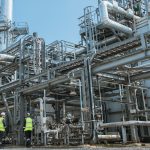
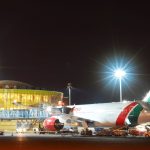
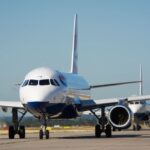
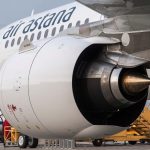

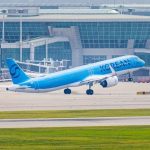



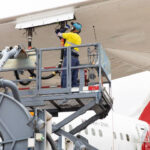



More News & Features
UK government starts new consultation on SAF revenue certainty mechanism
African Development Bank and Japanese industrialist unite to explore SAF production in Africa
LanzaJet and KMG agree to progress SAF production project in Kazakhstan
SkyNRG says e-SAF and carbon removals should not be competing strategies for aviation decarbonisation
South Korea announces mandatory SAF blending for departing international flights from 2027
Catagen launches SAF production company and signs offtakes with Ryanair and Shell